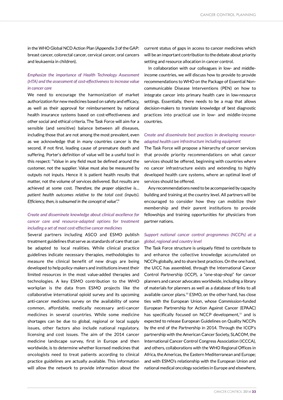
CANCER CONTROL PLANNING
34 CANCER CONTROL 2014
there is an ideal platform for the Task Force to promote and
disseminate best practice on the cancer medicines
component of an NCCP, including the European Guide on
Quality Improvement in Comprehensive Cancer, a subproject within the nascent EU Joint Action 2014-2017. The
Task Force also plans to draw upon the powerful networks of
ASCO and the NCI, as well as regional oncology societies
around the world.
Working with partners
The initial input to the Task Force came through the triad of
ESMO, WHO and the UICC, but a wide range of institutional
partners are also making essential contributions through
expertise accumulated over decades of research, training and
advocacy. Part of what makes the Global Cancer Task Force
so valuable is its commitment to translating the skills and
knowledge of the medical oncology community into usable
tools for policy-makers. Thus, in addition to pursuing the
scientific and technical goals detailed in the previous section,
Task Force members will also encourage interfacing with
decision-makers in order to both understand policy needs
and to shore up support for cancer control as an integral pillar
of the social, health and development agenda.
True knowledge-brokering is not linear, but rather
depends on network approaches that take advantage of
what each focal point has to offer through multiple channels
and intermediaries. This approach entails considerable
complexities in maintaining fluid lines of communication, but
it also adds value by channeling all relevant participants'
activities towards a common, policy-oriented goal. The first
collective step is in defining what evidence needs to be
generated, that is, in defining the global cancer research
agenda in a way that takes into account current knowledge,
promising advances and diverse stakeholders' needs. The
Task Force, through local, national, regional and global
partners, is conceived to fill this gap, assembling patient
advocacy groups, cancer control champions, scientific
societies and policy organisms in WHO Member States. By
forming a broad coalition of cancer control advocates, the
precise coordinates of cancer policy goals can be mapped for
all parties.
The Task Force will also help translate the urgent need for
more and better cancer control into tools that decisionmakers
can use for political advocacy as well as policy
support. This includes the development of concise, evidencebased briefs that help translate
scientific language and
recommendations into a range of policy options, including the
advantages and disadvantages of alternative avenues of
action. The emphasis on HTA, cost-effective cancer
treatment regimes (as opposed to individual medicine lists),
and the development of national cancer control programmes
(always keeping in mind questions of equitable access to
cancer care) are all conceived to respond to policy challenges,
in a context in which cancer control is just one of many
challenges originating in the health system and the wider
social, political and economic context. International
organizations, such as WHO, the European Union and others,
will contribute by setting global recommendations that
may act as a guiding star for Member States, while local
partners, such as national medical oncology societies,
will be instrumental in refining and adapting these
recommendations to a country level.
Conclusion and call to action
The primary goal of the ESMO Global Cancer Task Force is to
make the case for better cancer screening and care within the
broader agenda of the WHO-led Global NCD Action Plan.
The Action Plan represents a formal acknowledgement of the
importance of non-communicable diseases on the global
health agenda, a fact which cancer control advocacy groups
should applaud unreservedly. Rooted in strong public health
principles that aim to promote long, healthy lives through the
control of behavioural health determinants, the WHO Plan is
also concerned with the patients suffering from chronic
diseases. As demographic, economic and social shifts
consolidate over the next decades, this population will
unfortunately grow, and their needs deserve high priority on
national and international health and political agendas.
Founded on the compiled knowledge of the leading
professional organizations in cancer control, the Global
Cancer Task Force has been created to provide best practice
reference on actions that will make a difference in reducing
cancer mortality and in increasing the quality of life of cancer
patients. Too often, scientists direct their efforts exclusively
to research, decision-makers to policy, and patient advocates
to awareness-raising. By harnessing the collective power of
all of these actors and catalyzing their energy towards a
common goal, we hope to achieve the kind of synergy that can
truly make a difference to cancer control, changing the way
patients see policy and policy-makers see science, and
creating a new foundation on which to build future advances
in medical oncology.
Acknowledgements
The authors would like to express their gratitude to Gracemarie
Bricalli (ESMO International Affairs Manager) for her
indispensable help in the conception of the paper and in securing
its publication, to Alex Eniu (Chair ESMO Emerging Countries Task